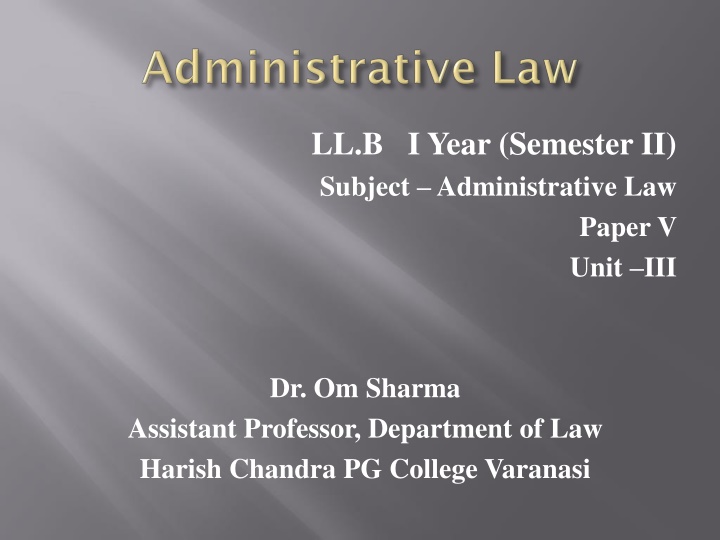
Principle of Promissory Estoppel in Administrative Law and Judicial Behaviors in India
Explore the principle of promissory estoppel in administrative law, its implications on legal relationships, and judicial precedents in India regarding estoppel against the government. Understand the constitutional restrictions applicable and various legal aspects related to estoppel.
Download Presentation

Please find below an Image/Link to download the presentation.
The content on the website is provided AS IS for your information and personal use only. It may not be sold, licensed, or shared on other websites without obtaining consent from the author. If you encounter any issues during the download, it is possible that the publisher has removed the file from their server.
You are allowed to download the files provided on this website for personal or commercial use, subject to the condition that they are used lawfully. All files are the property of their respective owners.
The content on the website is provided AS IS for your information and personal use only. It may not be sold, licensed, or shared on other websites without obtaining consent from the author.
E N D
Presentation Transcript
LL.B I Year (Semester II) Subject Administrative Law Paper V Unit III Dr. Om Sharma Assistant Professor, Department of Law Harish Chandra PG College Varanasi
The principle of promissory estoppel is that where one party has by his words or conduct made to the other a clear and unequivocal promise or representation , which is intended to create legal solutions or affect a legal relationship to arise in the future , knowing or intending that it would be acted upon by the other party to whom the promise or representation is made , and if in fact so acted upon by the other party , the promise or representation would be binding on the party making it and he would not be entitled to go back upon it , if it would be inequitable to allow him to do so , having regard to the dealings which have taken place between the parties .
Judicial behaviour clearly indicated that in India , estoppel would not be available against the govt. in violation of a statute . ThakurAmar Singhji v. State of Rajasthan , AIR 1955 SC 504 . Mathra Prasad & Sons v. State of Punjab , AIR 1962 SC 745. Union of India v. Anglo Afghan Agencies ltd. , AIR 1968 SC 718 . Century Spinning and Manufacturing company v. Ulhasnagar Municipal Council , AIR 1971 SC 1021 .
Shree Krishna v. Kurukshetra University , AIR 1976 SC 376 . Motilal Padampat Sugar mills v. State of U.P. , AIR 1979 SC 621 . Jit Ram Shiv Kumar v. State of Haryana , AIR 1980 SC 1285 . Union of India v. Godfrey Phillips India ltd , AIR 1986 SC 806 . Delhi Cloth & General mills v. Union of India , AIR 1987 SC 2414 . M. P. Mathur v. DTC , AIR 2007 SC 414 .
The conditions in which the principle Constitutional restrictions applicable , can be explained under the following headings : of is not I . Pubic Interest U. P. Power Co. ltd. v. Sant Steel & Alloys (P) ltd. , AIR 2008 SC 693 . Motilal Padampat Sugar mills v. State of U.P. , AIR 1979 SC 621 .
II . Legislative Work Motilal Padampat Sugar mills v. State of U.P. , AIR 1979 SC 621 III . Injunction Against Law Motilal Padampat Sugar mills v. State of U.P. , AIR 1979 SC 621 Dr. Ashok Kumar Maheshwari v. State of U.P. , AIR 1998 SC 966 .
IV . Empowerment Administation Home Secretary v. Darasjit Singh Grehwal , (1993) 4 SCC 25 . Dr. Ashok Kumar Maheshwari v. State of U.P. , AIR 1998 SC 966 . V . Fraud VI . Fraud with the Constitution
Basant Kumar Radha Kishan Bora v. Board of Tourism of Port of Bombay , AIR 1991 SC 14 . VII . Equity Basant Kumar Radha Kishan Bora v. Board of Tourism of Port of Bombay , AIR 1991 SC 14 .
